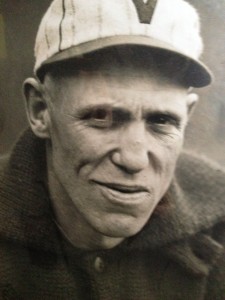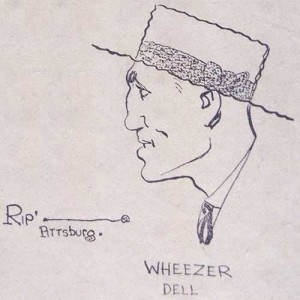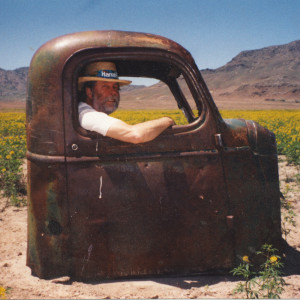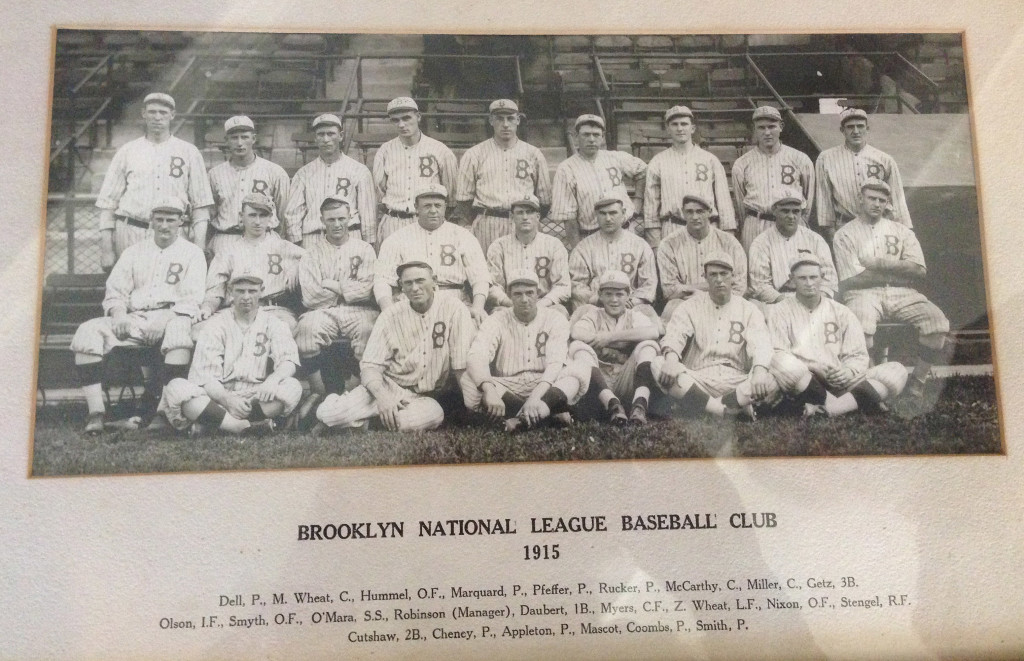Wheezer Dell: A Life Hit Out of the Park
July – August 2015
Nevada’s first Major League Baseball player pitched in the World Series.
BY DAVID TOLL
I spent three pleasant days delving into a Wheezer Dell archive—especially a thick scrapbook into which Eleanor Dell had pasted newspaper clippings about her husband’s career as a baseball player.

It begins with accounts of games he pitched for the Seattle Giants after they were married in 1914, carries through three years with Brooklyn; his years in the Pacific Coast League, first with Vernon and thenSeattle again; then the Atlanta Crackers; and at last to Beaumont, Texas, where he pitched his final season in 1926 for the Exporters.
The album has some peculiarities. The sheets the news clips had been pasted on were brittle; many of them torn away from the binding so that over the years the loose pages fell out of order. The clippings aren’t dated or sourced, just clipped out and pasted in. Eleanor made it even more interesting by treating each page as a mosaic collage, pasting small clips in the gaps left by big ones, so there is no certainty of source or sequence.
Most of the clips are game reports but there are also some reminiscences and other features that throw light on the years before Eleanor, so that a firmly grounded sketch of his life emerges.
HUMBLE BEGINNINGS
He was born William George Dell in Tuscarora June 11, 1886, and moved by 1890 to Butte, Montana, where he was such a good high school quarterback that he was allowed an extra year of football eligibility after graduation. He played sandlot baseball as a kid, and was a pitcher on the high school team.
After he graduated, he went to work at the mine as an electrician and pitched for a semi-pro company team. After that, he pitched for a succession of bush league teams, working as a journeyman electrician at the mine in the winter and a journeyman ballplayer around the Northwest in the summer.
In 1908, he signed with the Vancouver Beavers in the old Northwest League and helped them win the pennant. Four years later he was sold to the St. Louis Cardinals. He had made it to the big leagues!
He lasted three weeks.
ROUGH INNING
There are a few references to his brief interlude with the Cards in the scrapbooks, centered on his beefs with manager Roger Bresnahan, and there is no mystery about his quick departure. Wheezer wasn’t satisfied with his contract and Bresnahan wasn’t satisfied with Wheezer’s attitude. One reporter wrote, “Roger Bresnahan, manager of the Cubs, says that the only thing that will keep Weiser Dell, Seattle pitcher, from being a sensation on the National League is laziness. Dell was with St. Louis when Bresnahan was there but didn’t try very hard to make good.”

Marquard, an ex-Giant, was the starter for Brooklyn. He ran into trouble in the third inning and gave up 5 runs. He gave up another run in the 4th and with one out manager Wilbert Robinson called on Wheezer. Wheezer then pitched two scoreless innings (despite hitting Giants shortstop Art Fletcher with a pitch) but gave up three runs in the 7th and was yanked. Red Smyth pinch-hit for him in the 8th and struck out.
The New York Times reported: “John Armstrong Russell, the young man Brooklyn snared in far-off Vancouver, pitched the last two innings, and looked better than Rube and Wheezer put together.”
Brooklyn lost both ends of the double-header and Wheezer never played for the Robins again. Why? He hit a batter and made an error, but the game was already lost. I might have missed a clipping that explained his disappearance, but…he was gone.
I did find one clue. A clipping relating to his minor league career made this reference to his Brooklyn years: “Dell was a curiosity of hard luck when with Brooklyn. He was the best-looking pitcher who could not win that ever broke into the National League. Upon one occasion the Superbas failed to score a run for him in 44 consecutive innings. Some of the innings were in games he started and others in games he finished, but no matter what the conditions were, the Superbas could not put over a run.”
Wheezer was gone from the major leagues for good after that game. By the following spring he was playing for the Vernon Tigers in the Pacific Coast League and beginning a truly magical stretch of years that put him in the PCL Hall of Fame—and the movies.
*The Brooklyn team was fielded as the Atlantics (1884), Grays, Bridegrooms, Grooms, Bridegrooms again, Superbas, Trolley Dodgers, Superbas again, Robins and finally Dodgers (1932).



